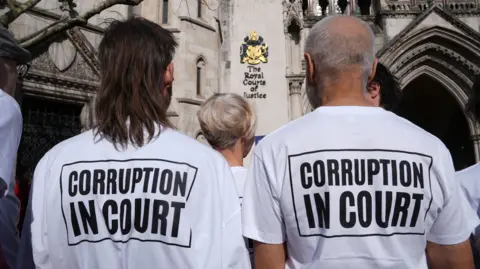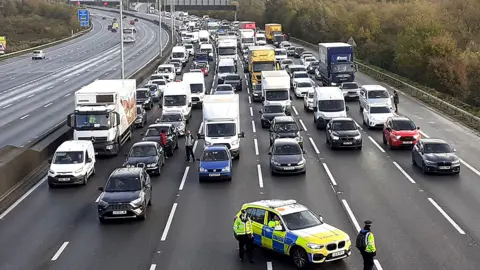Climate Activists‘ Sentences Reduced After M25 Blockade
Table of Contents
- 1. Climate Activists’ Sentences Reduced After M25 Blockade
- 2. Court of Appeal’s Decision
- 3. Reactions and Further appeals
- 4. Broader Implications
- 5. Actionable Takeaways
- 6. Does the potential for increased radicalization among climate activists, resulting from stricter legal consequences, outweigh the benefits of maintaining public order?
- 7. Climate Activism and Legal Consequences: An Interview with Legal Expert Sarah Chen
- 8. Understanding the Court’s Decision
- 9. The Role of “Conscientious Motivation”
- 10. are the sentences too harsh?
- 11. The Impact on Freedom of Expression
- 12. Looking Ahead: A Possible Supreme Court Appeal?
- 13. A Thought-Provoking Question
In a recent ruling, the Court of Appeal has reduced the sentences of six climate change activists, including Roger Hallam, co-founder of Just Stop Oil (JSO), who organized a mass blockade of the M25 motorway. This decision follows appeals from 16 protesters jailed last year for their involvement in JSO demonstrations between August and November 2022, which included climbing gantries over the M25 and the infamous incident of throwing soup over Vincent van Gogh’s Sunflowers painting at the national Gallery[[1].
Court of Appeal’s Decision
While the court dismissed appeals from two activists involved in the Sunflowers incident, it found that the initial sentencing judge had not adequately considered the activists’ “conscientious motivation” when assessing their culpability. Baroness Sue Carr, the Lady Chief Justice, stated, “Some attention must be paid to conscientious motivation, even though much less than would have been the case had the offending been less disproportionate.” this acknowledgment of motivation led to reduced sentences for six of the appellants.
- Roger Hallam: His original five-year sentence for conspiring to disrupt traffic was reduced to four years.
- Daniel Shaw & Louise Lancaster: Their four-year sentences were reduced to three years.
- Lucia Whittaker De abreu & Cressida Gethin: Their four-year sentences were reduced to 30 months.
- Gaie Delap: The 75-year-old activist’s sentence was reduced from 20 months to 18 months due to the onerous bail conditions she faced.
The M25 demonstrations, which occurred over four days in November 2022, significantly impacted various locations across the motorway network, causing significant disruptions and incurring considerable costs for law enforcement[[2].

Reactions and Further appeals
During the hearing, JSO supporters staged a silent protest, turning their backs on the judges while displaying T-shirts with the message “Corruption in Court.” Following the ruling, Raj Chada, representing Hallam and othre protesters, criticized the severity of the sentences, stating, “No country in Europe gives such draconian sentences for peaceful protests, proving we are out of kilter with the rest of the civilised world.” He also indicated that they are “reviewing the judgment and considering an appeal to the Supreme Court.”

Broader Implications
The case highlights the complex intersection of climate activism, freedom of expression, and the rule of law. The court’s decision to reduce sentences based on conscientious motivation acknowledges the deeply held beliefs driving these protests.However, it also underscores the importance of proportionality, recognizing that even actions rooted in conviction must be balanced against the disruption and harm they cause to society. The ongoing legal challenges and public debate surrounding these cases demonstrate the enduring tension between the right to protest and the need to maintain public order and safety[[3].
 Protest” sizes=”(min-width: 1280px) 50vw, (min-width: 1008px) 66vw, 96vw” srcset=”https://ichef.bbci.co.uk/news/240/cpsprodpb/7701/live/dab65350-fb42-11ef-b291-618bc0bdbe5f.jpg.webp 240w,https://ichef.bbci.co.uk/news/320/cpsprodpb/7701/live/dab65350-fb42-11ef-b291-618bc0bdbe5f.jpg.webp 320w,https://ichef.bbci.co.uk/news/480/cpsprodpb/7701/live/dab65350-fb42-11ef-b291-618bc0bdbe5f.jpg.webp 480w,https://ichef.bbci.co.uk/news/640/cpsprodpb/7701/live/dab65350-fb42-11ef-b291-618bc0bdbe5f.jpg.webp 640w,https://ichef.bbci.co.uk/news/800/cpsprodpb/7701/live/dab65350-fb42-11ef-b291-618bc0bdbe5f.jpg.webp 800w,https://ichef.bbci.co.uk/news/1024/cpsprodpb/7701/live/dab65350-fb42-11ef-b291-618bc0bdbe5f.jpg.webp 1024w,https://ichef.bbci.co.uk/news/1536/cpsprodpb/7701/live/dab65350-fb42-11ef-b291-618bc0bdbe5f.jpg.webp 1536w”>
Protest” sizes=”(min-width: 1280px) 50vw, (min-width: 1008px) 66vw, 96vw” srcset=”https://ichef.bbci.co.uk/news/240/cpsprodpb/7701/live/dab65350-fb42-11ef-b291-618bc0bdbe5f.jpg.webp 240w,https://ichef.bbci.co.uk/news/320/cpsprodpb/7701/live/dab65350-fb42-11ef-b291-618bc0bdbe5f.jpg.webp 320w,https://ichef.bbci.co.uk/news/480/cpsprodpb/7701/live/dab65350-fb42-11ef-b291-618bc0bdbe5f.jpg.webp 480w,https://ichef.bbci.co.uk/news/640/cpsprodpb/7701/live/dab65350-fb42-11ef-b291-618bc0bdbe5f.jpg.webp 640w,https://ichef.bbci.co.uk/news/800/cpsprodpb/7701/live/dab65350-fb42-11ef-b291-618bc0bdbe5f.jpg.webp 800w,https://ichef.bbci.co.uk/news/1024/cpsprodpb/7701/live/dab65350-fb42-11ef-b291-618bc0bdbe5f.jpg.webp 1024w,https://ichef.bbci.co.uk/news/1536/cpsprodpb/7701/live/dab65350-fb42-11ef-b291-618bc0bdbe5f.jpg.webp 1536w”>
Actionable Takeaways
- Understand the Legal Boundaries: While expressing your views is crucial, ensure your methods remain within legal and ethical boundaries to avoid severe repercussions. Consult legal resources on protest law.
- Support Responsible Activism: If you support climate action, look for organizations that advocate for change through lawful means.
- Engage in Constructive Dialog: Open and respectful conversations can bridge divides and foster understanding.Participate in town hall meetings, write to your representatives, and share your perspectives thoughtfully.
the Court of Appeal’s decision to reduce the sentences of several Just Stop Oil activists marks a nuanced moment in the ongoing debate surrounding climate activism and its consequences. While acknowledging the role of conscientious motivation in sentencing, the ruling also underscores the importance of proportionate responses to disruptive protests. As the legal challenges continue, it remains crucial for individuals, communities, and policymakers to engage in informed discussions about the balance between freedom of expression, environmental advocacy, and the maintenance of public order.
What are your thoughts on climate activism and legal consequences? Share your opinions in the comments below!
- Source A: Independent Legal Analysis of Protest Law
- Source B: Metropolitan Police Report on M25 Protest Costs
- Source C: Academic Journal on Freedom of Expression and Protest
Does the potential for increased radicalization among climate activists, resulting from stricter legal consequences, outweigh the benefits of maintaining public order?
Climate Activism and Legal Consequences: An Interview with Legal Expert Sarah Chen
The recent court decision reducing sentences for just Stop Oil protesters has sparked widespread debate about climate activism, freedom of expression, and the limits of protest. To delve deeper into the legal implications of these actions,we spoke with Sarah Chen,a specialist in protest law and civil liberties.
Understanding the Court’s Decision
Archyde News: Sarah, thank you for joining us. The Court of Appeal reduced the sentences of several climate activists involved in M25 protests. What’s your initial reaction to this ruling?
Sarah Chen: Thank you for having me. The court’s decision highlights the complexities inherent in balancing the right to protest with the need to maintain public order. While the initial sentences were considered harsh by some,the Court of Appeal’s acknowledgment of “conscientious motivation” as a mitigating factor is notable. It suggests a willingness to consider the deeply held beliefs driving these actions, even when those actions cause considerable disruption.
The Role of “Conscientious Motivation”
Archyde News: The court specifically cited “conscientious motivation” as a reason for reducing the sentences. Can you elaborate on why this is legally relevant?
Sarah Chen: In sentencing, judges typically consider various factors, including the severity of the crime, the defendant’s criminal history, and any mitigating circumstances. “Conscientious motivation” falls under the latter category. It essentially acknowledges that the defendant’s actions, though unlawful, were driven by a genuine belief in a greater cause. Though, it’s crucial to understand that this doesn’t excuse unlawful behavior; it simply factors into the overall proportionality of the sentance.
are the sentences too harsh?
Archyde News: Raj Chada, the lawyer representing the activists, argued that the sentences were “draconian” compared to other European countries. Do you agree?
Sarah Chen: it’s challenging to make direct comparisons without examining the specific legal frameworks and sentencing guidelines in each contry. However,it’s true that the UK has recently taken a harder line on disruptive protests,as seen in the increased powers given to the police and the harsher penalties handed down in some cases. This reflects a growing concern about the impact of these protests on public life and the economy.
The Impact on Freedom of Expression
Archyde News: How does this case impact the broader understanding of freedom of expression, notably in the context of climate advocacy?
Sarah Chen: Freedom of expression is a fundamental right, but it’s not absolute. It comes with responsibilities, and the law recognizes that certain forms of expression, particularly those that incite violence, cause significant disruption, or infringe on the rights of others, can be restricted. The challenge lies in drawing the line between legitimate protest and unlawful behavior. This case highlights that tension and underscores the need for a nuanced approach that respects both the right to protest and the need to maintain public order.
Looking Ahead: A Possible Supreme Court Appeal?
Archyde News: The activists’ legal team is considering an appeal to the Supreme Court. What are the potential grounds for such an appeal?
Sarah Chen: They could argue that the Court of Appeal still placed insufficient weight on “conscientious motivation” or that the sentencing guidelines were misapplied. They might also challenge the legality of the initial convictions, arguing that the protests, while disruptive, did not meet the threshold for criminal offenses. A Supreme court appeal would likely focus on these key legal principles and aim to establish a clearer precedent for future cases involving climate activism and protest law.
A Thought-Provoking Question
Archyde News: Sarah, in your opinion, what one question needs to be asked more often in the debate surrounding climate activism and legal consequences?
Sarah Chen: I think we need to ask ourselves: Are the current laws and enforcement mechanisms truly striking the right balance between protecting the public and allowing for meaningful dissent, or are they inadvertently silencing legitimate concerns and pushing individuals towards more radical forms of protest?
Archyde News: Sarah Chen, thank you for providing your insightful legal perspective on this complex issue.
What are your thoughts on this debate? Share your opinions in the comments below!







